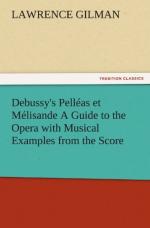VI. GOLAUD
[Illustration: Tres soutenu]
“You look like a mere child,” he says, and the Melisande theme is given out, doux et calme, by the divided strings (page 18, measure 2). As the two go out together, the motive of Fate is quietly intoned by the horns (page 22, measure 3).
An interlude of some fifty measures, in which the Forest, Fate, and Melisande themes are exploited, introduces the second scene of the act. To an accompaniment of long-sustained chords varied by recurrences of the Melisande theme, Genevieve reads to the venerable Arkel Golaud’s letter to his brother. The entrance of Pelleas is accompanied by the theme which characterizes him throughout—the second of the two motives (that of Melisande being the other) which most conspicuously dominate the score. It is announced (page 33, measure 10) by three flutes and a clarinet, over a viola accompaniment:
VII. PELLEAS
[Illustration: Animez un peu]
The scene closes with a variant of this, and there is an interlude in which the orchestra weaves a commentary out of the themes of Fate and Golaud’s Love.
As the third scene opens (before the castle), the Melisande theme is sung, melancolique et doux, by the oboe against a murmuring accompaniment of the strings. Together with the Pelleas theme, it accompanies the opening portion of the scene. A suggestive use is made of a fragment of the Fate theme at Melisande’s words, after Pelleas prophesies the approach of a storm: “And yet it is so calm now!” (page 44, measure 5). Just before the voices of the departing sailors are heard, the curious student will note a characteristic passage in the orchestra (page 45, measure 1)—a sequence of descending “ninth-chords” built on a downward scale of whole tones. The Fate theme, combined with that of Melisande, colors the rest of the scene to the end. The conclusion of the act is striking: two flutes outline a variant of the Melisande motive; a horn sounds the first three notes of the second measure of the Fate theme, and four horns and flute sustain, pp, an unresolved suspension—C#-F#-A#-D#-G#.
VIII
[Illustration: presque plus rien]
ACT II
The Pelleas theme, sung by two flutes, opens the brief introduction to the second act. It is repeated, interwoven with harp arpeggios. Immediately preceding the entrance of Pelleas and Melisande a muted horn, two flutes, two oboes, and harp sound a chord of singularly liquid quality—one of those fragmentary effects in the invention of which Debussy is so curiously happy. It is the motive of The Fountain.[8]




